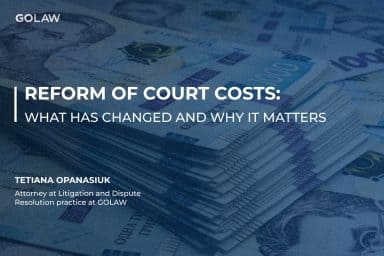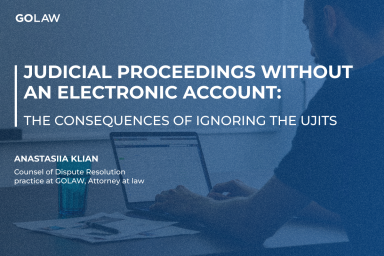The Supreme Court: Letters, sent by the court to the court case parties via e-mail, are considered properly delivered
In a case, the Supreme Court (SC) heard, the complainant referred to a violation of procedural law by the court of appeal for allegedly failing to send him a copy of the appeal and the decision to open the appeal proceedings.
As the SC determined, the documents were sent to the complainant via an e-mail address, which the latter previously indicated in procedural documents.
The SC stated that the party provided the court with its mail voluntarily and was not obliged to do so. The Supreme Court concluded that a court that communicates with a party through the means provided by the party acts lawfully and in good faith. Therefore, one should proceed from the “presumption of knowledge”: the person to whom the court’s notice is addressed through such means of communication knows or at least should have known about the notice.
The Supreme Court also pointed out that a party to a court case has both rights and specific obligations. The case law of the European Court of Human Rights stipulates that a party involved in a court case must take an interest in the proceedings within a reasonable timeframe, exercise its procedural rights in good faith, and strictly fulfill its procedural obligations.
Thus, when notifying the Court of their e-mail address, the parties to the case should consider that the Court has the right to send notifications by mail or e-mail at its own discretion. It is presumed that a party to the case is aware of the content of such a notice if it is sent to his/her e-mail.
It should also be noted that following the provisions of part 6 of Article 14 of the Code of Civil Procedure of Ukraine, lawyers, notaries, private enforcement officers, insolvency officers, forensic experts, state authorities, local self-government bodies and business entities of the state and municipal sectors of the economy shall register official e-mail addresses in the Unified Judicial Information and Communication System on a mandatory basis. Other persons register official e-mail addresses in the Unified Judicial Information and Communication System on a voluntary basis.
Resolution of the Supreme Court of June 28, 2023, in the case No. 757/48467/21
For more articles, court positions, and practical advice on litigation in Ukraine, please visit

Kateryna Tsvetkova
Partner, Litigation and Dispute Resolution practice, Attorney at law
- Contacts
- 31/33 Kniaziv Ostrozkykh St, Zorianyi Business Center, Kyiv, Ukraine, 01010
- k.tsvetkova@golaw.ua
- +38 044 581 1220
- Recognitions
- LEXOLOGY INDEX 2025
- The Legal 500 EMEA 2024
- Who's Who Legal 2022 - 2024

Ihor Selivakin
Associate, Attorney at law
- Contacts
- 31/33 Kniaziv Ostrozkykh St, Zorianyi Business Center, Kyiv, Ukraine, 01010
- i.selivakin@golaw.ua
- +380 44 581 1220
Sign up to be aware
New achievements are inspired by information. GO further, don’t miss out GOLAW news and legal alerts
Our expertise
-
- Antitrust and Competition
- Banking and Finance
- Compliance, Corporate Governance and Risk Management
- Corporate and M&A
- Criminal and White Collar Defence
- Defense in Anti-corruption procedures and regulations
- Labor and Employment
- Natural Resources and Environment
- Government Relations (GR)
- Insolvency and Corporate Recovery
- Intellectual property
- International trade
- Legal support of business and private Сlients in Germany
- Litigation and dispute resolution
- Private clients
- Real Estate and Construction
- Energy and Natural Resources
- Restructuring, Claims and Recoveries
- Martial Law
- Tax and Customs
-
- Agribusiness
- Aviation
- Chemical industry
- Engineering, Construction and Building Materials
- Natural Resources and Environment
- Financial institutions
- IT and AI
- Industry and manufacturing
- Healthcare industries, Life sciences and Pharmaceuticals
- Media, Entertainment, Sports and Gambling
- Retail, FMCG and E-Commerce
- Transport and Logistics
We use cookies to improve performance of our website and your user experience.
Cookies policy
Cookies settings







